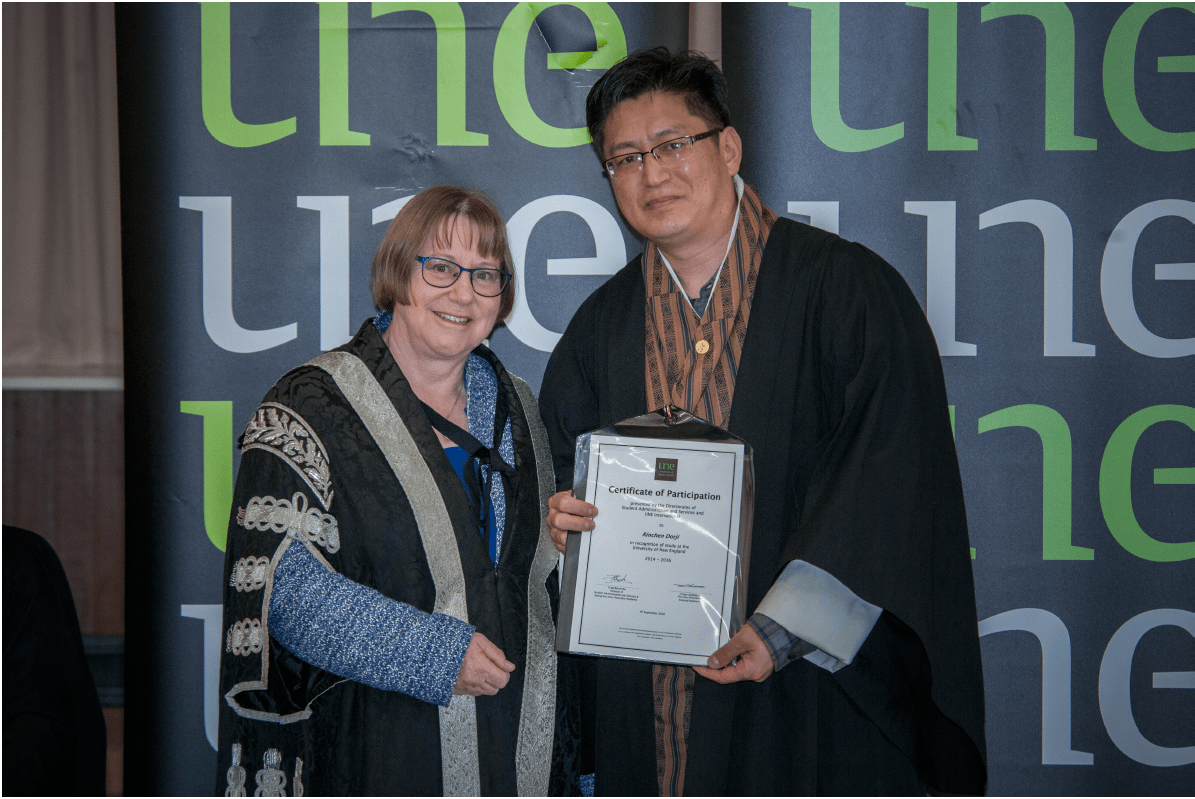Image: University of New England (UNE) Vice-Chancellor Annabelle Duncan presents a certificate to Rinchen Dorji.
Bhutanese education leader and UNE School of Education PhD graduate, Rinchen Dorji, could have followed any career path. But he chose teaching, and has never looked back.
“This is the 24th year of my service in the Bhutanese education system and of these many years of service, I have spent most of my career as a classroom teacher. I love the opportunity it provides for perpetual learning and growth. I have enjoyed every bit of my job,” he says.
Rinchen is the newly appointed President of Samtse College of Education, under the Royal University of Bhutan – the first pre-service teacher training college in Bhutan. Here, he’s working to combine the best of the Bhutanese education system with international best practice in teacher education.
If he could pick one thing the Bhutanese school system does really well, he says it’s the focus on happiness and wellbeing, drawn from Buddhist philosophy.
“One of the distinct and unique characters of the school system in Bhutan is the happiness element inspired by the country’s development philosophy of Gross National Happiness. The instance of bullying in the school system in Bhutan is almost non-existent, or very rare.
“Bhutanese, by culture, are very loving in nature and the timeless values of ‘tha damtse and ley jumdrey’ – the practice of unconditional regard and respect for your fellow beings, which comes from the Buddhist belief in Karma, the law of cause and effect – plays a huge role in every fabric of the Bhutanese society including in the school settings,” he says.
As for teacher education, what’s striking about the Royal University of Bhutan’s Samtse College of Education, is its focus on programs for contemplative and mindfulness practices.
“Besides the usual teacher education programs, Samtse College of Education provides a Postgraduate Diploma and a Master of Arts in Contemplative Counselling and Psychology, inspired by contemplative and mindfulness practices. Self-awareness and mindfulness help people to be good human beings with kindness, generosity and compassionate empathy.”
Rinchen came to UNE to learn more about inclusive education, an area Bhutan is now working hard to develop.
“My PhD research was focused on investigating the attitudes of Bhutanese teachers, school principals and past students with visual impairments towards inclusive education in Bhutan. I am working with my colleagues in Samste College to integrate inclusive education principles and ideas into a new Postgraduate Diploma in Education program.”
He says his time at UNE taught him more than he anticipated.
“I think the learning that I acquired through my social interaction and observation of the good practices at UNE has also made a huge impact in my leadership role at the college and helped me incorporate the values of inclusion, cooperation, collaboration and teamwork,” he says.
Now a proud member of the UNE Bhutanese Alumni group, UNE and Armidale hold a special place for him and his family.
“I had a wonderful supervisory team. I try to keep in touch especially with Associate Professor Judith Miller and Dr John Haynes, who are now my family’s very close friends. I knew many other people in the School of Education and especially the UNE International Office at a personal level who were always there for any kind of support and assistance I, as an international student, required.
“My family, including two young sons, had the most memorable times of our lives in Australia and Armidale. We shall treasure these beautiful times, and hope to be back in the near future if circumstances allow!”
Rinchen also hopes to have the opportunity to host UNE School of Education students at Samtse College when they visit later this year as part of a short study program.



Recent Comments